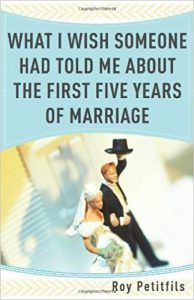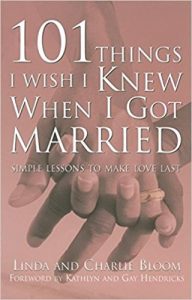The Early Years of Marriage: Two Books

 What I Wish Someone Had Told Me About the First Five Years of Marriage
What I Wish Someone Had Told Me About the First Five Years of Marriage
By Roy Petitfils
101 Things I Wish I knew When I Got Married
By Linda and Charlie Bloom
Once the honeymoon is over, “the sobering reality of making a relationship work” sets in for newly married couples, Roy Petitfils writes in “What I Wish Someone Had Told Me About the First FiveYears of Marriage.” Marriages are “most at risk for divorce” during the first five years, and “there are some core areas which need attention in the early years of every marriage,” he says.
Petitfils points out that during a marriage’s first five years, “individual goals, desires and values that were not clarified before the wedding are illuminated and sometimes come into sharp contrast with those of our spouse.” During this time, couples make “major decisions about such things as lifestyle, career, having and raising children and financial planning, to name but a few.”
Linda and Charlie Bloom agree that the early years of marriage are a crucial time. In “101 Things I Wish I Knew When I Got Married,” the Blooms say:
“It’s at the beginning of most marriages that we are likely to encounter the real challenges of commitment, such as the need to let go of control, the ability to overcome resistance to change, the willingness to put aside our ego-desires in favor of shared concerns, and the willingness to be vulnerable and honest in the face of fear and pain.”
Couples tend to discover after marrying that there is much to learn if they are not only to survive in marriage, but to thrive because of it. Petitfils and the Blooms have written books succinctly calling attention to many essentials of living together as a married couple.
Petitfils is a Catholic school counselor and a marriage counselor. The Blooms are both psychotherapists with long experience in relationship counseling. These authors’ books are not echoes of each other, but a number of parallel concerns inhabit them.
Tips for Handling Conflict
The handling of personality differences and of conflicts between a wife and husband is one area of shared concern. The Blooms believe it takes a while after marrying “to realize that making room for differences to peacefully coexist” is a wise use “of precious life energy.”
The Blooms advise couples, in addition, that “in any partnership there is no such thing as win-lose; if what you gain is at your partner’s expense, then you both have lost.” One of their 101 points about marriage is that “even the best marriages have irreconcilable differences.”
Similarly, Petitfils holds that “what distinguishes lasting relationships from those that don’t make it is the ability to recognize potential sources of conflict, acknowledge when conflict is happening and work constructively through toward resolutions.” His advice on “fighting fair” seemed helpful, particularly in outlining steps couples can take to de-escalate tension when it surfaces and to avoid pouring “more gas on the fire.”
Petitfils advises husbands and wives to remain kind during a conflict. Kindness, he explains, means refusing to engage in name-calling, not making “insulting, disrespectful or demeaning remarks about our spouse,” respecting each other’s “hot spots” and taking no “cheap shots at one another.”
He says to couples in marriage counseling: “Be kind to one another. No cursing. No name-calling.”
What else do these authors “wish” they had known about marriage when they married?
Setting Priorities
The importance of knowing “our priorities” is accented by Petitfils. Research has shown that in the early years of marriage, couples have trouble “balancing time spent among their various commitments.” His steps for clarifying priorities could well aid husbands and wives struggling to balance commitments and still find time for each other.
What to do when one spouse gets sick is discussed by Petitfils in a unique chapter titled “In Sickness and in Health, in Good Times and in Bad.” Nothing says “I love you” the same way “being with someone while they are ill, suffering and depressed does,” he says.
I appreciated the author’s inclusion in this chapter of a section titled “Coping With a Miscarriage.” I know from my own marriage that this challenge may be encountered during a couple’s first five years.
The Blooms’ book contains 101 chapters, each of which starts with a box containing a brief statement of advice. Here are a few of those statements:
“If your job gets your best energy, your marriage will wither.” “Commitment isn’t a prison; it’s a means to greater freedom.” “Don’t neglect your friends just because you’ve acquired a spouse.” “Don’t keep feelings of gratitude to yourself.” “If your partner thinks something is important, it is!”
Threaded through these books is their authors’ encouragement to regard struggles not as signs of failure but as invitations to grow in marriage. “Anyone, at any time, can accept the challenges that continually present themselves, rather than avoid them. In the acceptance of the challenges, compassion, wisdom and love mature,” the Blooms write.
Petitfils puts it this way: “No marriage is free from times of struggle. No vocation or state in life is.” However, his experience is that “the good times far outweigh the challenging times.” He tells readers, “In married life I didn’t lose myself, I found myself.”
He states that yes, “there will be times of struggle, and relationships do require work. … But it is good work – meaningful work.”
About the reviewer
David Gibson is the former, now-retired editor of Origins, CNS Documentary Service.
Disclaimer: Book reviews do not imply and are not to be used as official endorsement by the USCCB of the work or those associated with the work. Book reviews are solely intended as a resource regarding publications that might be of interest to For Your Marriage visitors.




